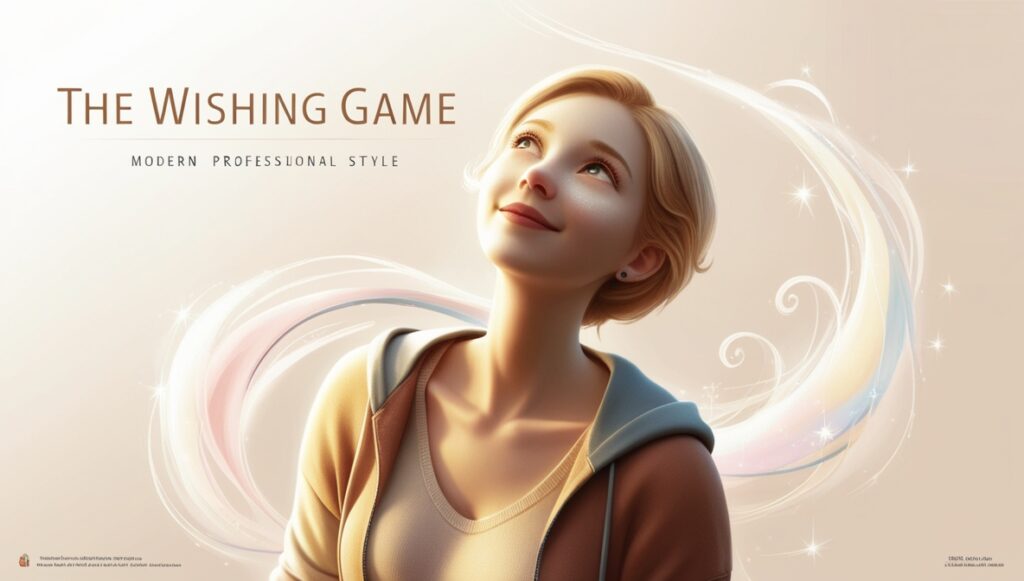
Introduction to The Wishing Game
The Wishing Game is a contemporary novel by Meg Shaffer, blending elements of magical realism, adventure, and heartfelt emotion. It tells the story of Lucy Hart, a young woman who has always found solace in the world of books—particularly in the beloved Clock Island series written by the enigmatic author Jack Masterson. The novel explores themes of childhood dreams, second chances, and the power of stories to shape and heal lives.
A Story of Dreams and Determination
Lucy Hart is a 26-year-old kindergarten teacher’s aide who has spent much of her life feeling invisible and unfulfilled. Growing up in a difficult home, she found escape in the pages of Clock Island, a fantasy book series that transported her to a world of wonder and hope. The series, written by the reclusive Jack Masterson, was more than just fiction to Lucy—it was a lifeline. Now an adult, she still cherishes those stories, using them to inspire the children she works with, especially Christopher, a troubled orphan who has become like a son to her. However, Lucy lacks the financial stability needed to adopt him and give him the home he deserves.
Everything changes when Jack Masterson, who had mysteriously stopped writing years ago, suddenly announces a once-in-a-lifetime competition. He has written a new book—the long-awaited next installment of Clock Island—and he invites a select group of readers to compete for the only existing copy. The winner of this contest will not only receive the book but also a substantial prize that could change their life forever. For Lucy, this is more than just a literary event; it’s her chance to secure a future with Christopher.
A Magical and Whimsical Competition
The contest takes place on Clock Island itself, the very setting of Masterson’s books. As Lucy arrives, she is joined by other devoted fans who have also been selected for this extraordinary challenge. The competition is designed to test their knowledge, passion, and understanding of the Clock Island series, as well as their ability to solve puzzles and navigate the whimsical, dream-like world that Masterson has created.
Throughout the novel, the competition becomes a metaphor for self-discovery. Lucy is forced to confront her fears, insecurities, and past wounds while forging unexpected friendships with the other contestants. Jack Masterson himself remains an enigmatic presence, guiding the participants through a journey that is as emotional as it is fantastical.
Themes of Hope, Love, and Redemption
Beyond its imaginative premise, The Wishing Game is a deeply emotional story about resilience, self-worth, and the courage to chase one’s dreams. Lucy’s love for Christopher drives her forward, pushing her to take risks she never imagined. Her journey highlights the power of found family and the idea that stories—both real and fictional—can change lives.
Jack Masterson’s character also adds depth to the novel, serving as a reminder of the loneliness that can come with creative genius and the redemptive power of sharing one’s art with the world. His contest is not just about choosing a winner; it is his own way of finding closure and passing on his legacy to those who need it most.
Plot Overview of The Wishing Game
Main Characters
- Lucy Hart
Lucy Hart is a 26-year-old kindergarten teacher’s aide with a deep love for books, particularly the Clock Island series. Having grown up in an unstable and unloving household, she found solace in Jack Masterson’s books, which provided her with an escape and a sense of belonging. Now an adult, Lucy struggles both financially and emotionally, working tirelessly to make ends meet while trying to care for Christopher, a young orphan who has captured her heart. She dreams of adopting him and providing him with the love and security she never had, but her financial situation makes it nearly impossible. When Jack Masterson announces a life-changing competition, Lucy sees it as her only chance to secure a better future for herself and Christopher. - Jack Masterson
Jack Masterson is a legendary yet reclusive bestselling children’s author known for his Clock Island series. Years ago, he abruptly stopped writing and withdrew from the public eye, leaving fans longing for more. His books, filled with magic, adventure, and heartfelt lessons, have shaped generations of readers, including Lucy. Now, after years of silence, he unexpectedly returns with a brand-new book and announces an exclusive contest on the real-life Clock Island, inviting four lucky contestants to compete for the only existing copy. Jack’s motivations for the contest remain mysterious, but as the competition unfolds, it becomes clear that he has his own reasons for orchestrating this elaborate challenge. - Hugo Reese
Hugo Reese is Jack Masterson’s longtime illustrator and assistant. While he initially comes across as gruff and no-nonsense, he has a deeply caring heart. He has been Jack’s confidant and protector, helping to shield him from the pressures of fame. As the contest progresses, Hugo plays a crucial role in guiding the participants and ensuring the challenges run smoothly. His interactions with Lucy, in particular, reveal a softer, more supportive side, and he becomes a mentor figure for her as she navigates the trials of the competition.
Plotline
Lucy Hart receives a life-changing invitation: she is one of four lucky contestants chosen to travel to Clock Island, the real-life setting of Jack Masterson’s legendary book series. The competition is a once-in-a-lifetime event, where the winner will receive the only existing copy of Jack’s long-awaited new book, a manuscript worth an immense fortune. For Lucy, this isn’t just about winning a book—it’s about securing a future. If she wins, she could sell the book for a life-changing sum of money, giving her the financial stability needed to adopt Christopher, the orphan she has grown to love like a son.
Once on Clock Island, Lucy finds herself immersed in a world that feels both familiar and surreal. Jack Masterson has transformed his island home into a magical playground filled with puzzles, riddles, and challenges inspired by his books. Lucy and the three other contestants must prove their knowledge of Clock Island, solve intricate literary-based puzzles, and navigate a series of emotional and intellectual trials designed by Jack himself.
As the competition unfolds, Lucy is tested in ways she never expected. The challenges are not just about book knowledge—they force her to confront her past, her fears, and her own self-worth. Throughout the journey, she forms unexpected bonds with the other contestants, experiences moments of doubt and determination, and grows closer to Jack and Hugo, who see in her something truly special.
But as the competition reaches its final stages, Lucy realizes that winning isn’t just about solving puzzles—it’s about understanding what truly matters. Jack’s contest is more than a game; it’s a test of heart, resilience, and the willingness to believe in the impossible.
Themes and Reception of The Wishing Game
Key Themes
1. Found Family
One of the central themes in The Wishing Game is the concept of found family—the idea that deep, meaningful bonds can be formed outside of traditional biological relationships. Lucy Hart, the protagonist, grew up in a difficult and emotionally neglectful household, never experiencing the love and security she longed for as a child. However, as an adult, she finds a sense of belonging in the people who genuinely care for her, including Christopher, the orphaned boy she wants to adopt.
Jack Masterson and Hugo Reese also serve as examples of found family. Jack, despite his fame and success, has led a lonely life, with only Hugo as his trusted companion. Through the competition on Clock Island, Jack and Lucy form a unique connection, with Jack recognizing something of his younger self in her. By the end of the novel, Lucy, Christopher, Jack, and Hugo create a non-traditional but deeply meaningful family unit, showing that love and support can come from unexpected places.
2. Childhood Trauma and Healing
The novel poignantly explores how childhood trauma shapes a person’s identity and emotional struggles well into adulthood. Lucy’s difficult upbringing left her with a deep sense of insecurity and self-doubt. She often feels unworthy of happiness and stability, which influences her reluctance to hope for a better future. Similarly, Jack Masterson’s decision to withdraw from the world hints at his own emotional scars. His books, much like Lucy’s love for Clock Island, became a refuge from his personal struggles.
Throughout the story, Lucy embarks on a journey of healing. As she participates in Jack’s competition, she is forced to confront the emotional wounds of her past. Winning isn’t just about securing financial stability—it’s about proving to herself that she is capable of achieving something meaningful. The novel beautifully illustrates that while childhood trauma can shape a person, it doesn’t have to define them. Through resilience, love, and the right support, healing is possible.
3. The Power of Stories
At its heart, The Wishing Game is a love letter to storytelling and the profound impact that books can have on our lives. Lucy’s childhood was made bearable by the Clock Island series, which gave her an escape from reality and instilled a sense of hope. The books were more than just entertainment—they were a source of guidance and comfort, shaping the person she became.
Jack Masterson, as the author of Clock Island, understands this power deeply. His contest is not just about giving away a book; it is his way of passing on a legacy, ensuring that his stories continue to inspire and transform lives. The novel highlights how stories can be a refuge in times of hardship, a way to understand ourselves, and a means of connecting with others.
Reception
The Wishing Game has been widely praised for its heartfelt storytelling, whimsical yet emotional plot, and deeply relatable characters. Readers and critics alike have lauded Meg Shaffer’s ability to blend magical realism with real-world struggles, creating a novel that is both enchanting and deeply moving.
1. Praise for Emotional Depth
Many reviewers have highlighted the novel’s emotional depth, particularly in its portrayal of Lucy’s struggles and the impact of childhood trauma. The themes of hope, resilience, and the pursuit of happiness resonate with readers who have faced their own personal challenges.
2. Strong Character Development
Lucy Hart is a character that many readers find relatable and inspiring. Her determination to provide a better life for Christopher, despite the obstacles in her way, makes her a compelling protagonist. Jack Masterson and Hugo Reese add layers of complexity to the story, making the novel a rich and character-driven experience.
3. Nostalgic and Magical Atmosphere
The setting of Clock Island and the structure of the competition evoke a sense of nostalgia, reminiscent of classic literary adventures. The book has been compared to stories like Charlie and the Chocolate Factory and The Night Circus for its blend of whimsy and emotional depth.
4. Minor Criticism
While most reception has been positive, some critics have noted that the novel follows a somewhat predictable narrative arc. However, they also acknowledge that the strength of the characters and themes make up for any predictability in the plot.
Reviews of The Wishing Game
The Wishing Game has received widespread acclaim from critics and readers alike, praised for its clever storytelling, emotional depth, and nostalgic charm.
Critical Acclaim
Many critics have described the novel as “clever, dark, and hopeful,” drawing comparisons to Willy Wonka & the Chocolate Factory—but with a more heartfelt and less unsettling atmosphere. The competition element, in which contestants solve puzzles to win a life-changing prize, evokes the spirit of classic adventure tales while maintaining a unique and emotionally rich narrative.
The novel’s balance of whimsy and realism has been particularly well received. Critics have noted that while The Wishing Game incorporates elements of magical realism, it remains deeply grounded in human emotions and struggles. Lucy Hart’s journey, shaped by childhood trauma and her fierce determination to build a better future, makes for a compelling and relatable read.
Nostalgic Appeal
Although The Wishing Game is not categorized as a young adult (YA) novel, many reviewers have appreciated its nostalgic feel. The book taps into the magic of childhood literature, much like the Clock Island series within the story itself. Readers who grew up loving books that transported them to fantastical places find The Wishing Game particularly resonant, as it captures the essence of how stories can shape lives and provide hope.
General Reader Response
Readers have praised the book’s strong character development, particularly Lucy Hart’s resilience and Jack Masterson’s enigmatic yet endearing personality. Many have found the themes of found family, second chances, and personal healing to be deeply moving. The setting of Clock Island and the literary competition add a sense of adventure and wonder, making the novel both entertaining and emotionally impactful.
However, some readers have pointed out that certain plot elements are somewhat predictable. Despite this, most agree that the novel’s charm, well-developed characters, and heartfelt message more than make up for any narrative familiarity.
Final Verdict
Overall, The Wishing Game has been highly praised for its emotional storytelling, nostalgic charm, and hopeful message. It is recommended for readers who enjoy books about second chances, literary adventures, and the enduring power of stories.
Awards and Recognition of The Wishing Game
The Wishing Game has garnered significant praise and recognition within the literary community. One of its most notable achievements is being named one of The Washington Post’s Best Books of the Year. This distinction highlights the novel’s impact, storytelling quality, and widespread appeal among readers and critics alike.
In addition to this recognition, the book has been praised for its engaging narrative, emotional depth, and nostalgic charm, making it a standout in contemporary fiction. It has also received positive mentions in various literary reviews and publications, further solidifying its reputation as a heartfelt and compelling novel.
With its unique blend of magical realism, literary adventure, and themes of resilience, The Wishing Game continues to resonate with readers, earning a place among the most celebrated books of the year.
Key Points Summary of The Wishing Game
- Genre: The Wishing Game is a contemporary novel with elements of magical realism, exploring themes of family, resilience, and second chances. It particularly resonates with readers interested in women’s fiction and emotional storytelling.
- Setting: The novel primarily takes place on Clock Island, the secluded home of reclusive author Jack Masterson. The island, inspired by his famous Clock Island book series, serves as the backdrop for a high-stakes literary competition that could change the protagonist’s life.
- Main Characters:
- Lucy Hart: The protagonist, a 26-year-old kindergarten teacher’s aide who dreams of adopting Christopher, a young orphan. She hopes to secure financial stability by winning Jack Masterson’s contest, which involves solving puzzles and riddles.
- Hugo Reese: Jack’s gruff yet kindhearted illustrator, known for his Cockney accent and artistic talent. Over the course of the novel, he develops a romantic connection with Lucy, adding a layer of emotional depth to the story.
With its rich storytelling, compelling characters, and nostalgic charm, The Wishing Game is a heartfelt novel about the power of stories, the importance of found family, and the pursuit of dreams.
FAQs About The Wishing Game
1. What is The Wishing Game about?
The Wishing Game follows Lucy Hart, a struggling teacher’s aide who enters a competition hosted by her favorite author, Jack Masterson, hoping to win a life-changing prize that could help her adopt an orphan named Christopher.
2. Who wrote The Wishing Game?
The novel is written by Meg Shaffer, a contemporary fiction author known for her heartfelt storytelling and themes of resilience and found family.
3. What genre does The Wishing Game fall under?
It is a contemporary fiction novel with elements of magical realism, focusing on themes of family, second chances, and the transformative power of stories.
4. Where is The Wishing Game set?
The story takes place primarily on Clock Island, a secluded and whimsical location that serves as the home of Jack Masterson and the setting for his famous Clock Island book series.
5. Who are the main characters in The Wishing Game?
- Lucy Hart: The protagonist, a 26-year-old teacher’s aide competing in Jack’s contest.
- Jack Masterson: A reclusive author who created Clock Island and organizes the literary competition.
- Hugo Reese: Jack’s illustrator, who develops a romantic connection with Lucy.
- Christopher: A young orphan whom Lucy hopes to adopt if she wins the contest.





